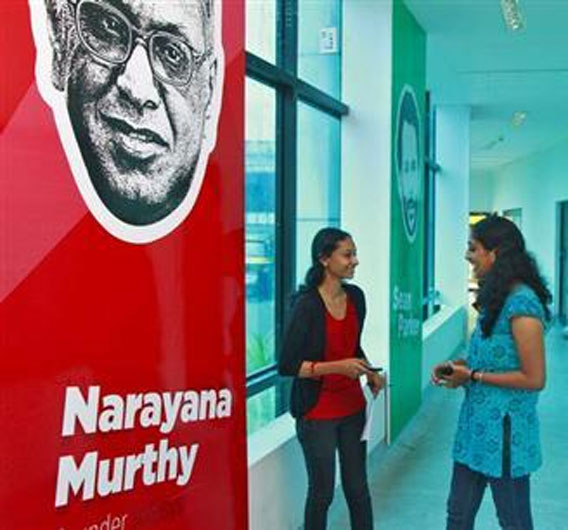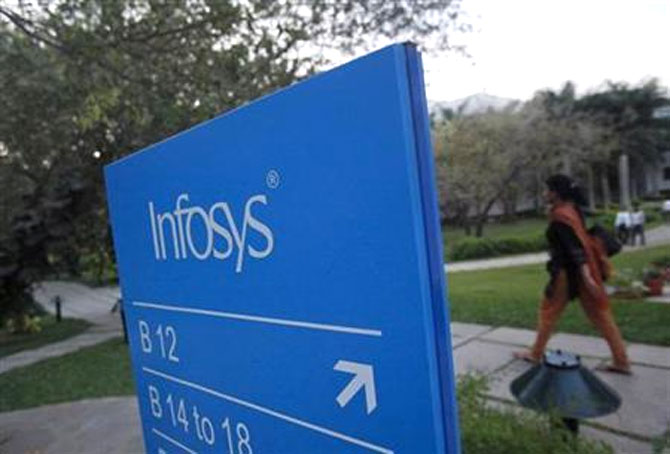Photographs: Prateek Karandikar/Wikimedia Commons BS Reporters in Bengaluru/Pune
Infosys, the country’s second biggest information technology company, going through a troubled leadership transition, has sent legal notices to three Indian newspapers for the first time in its history since seven entrepreneurs, including N R Narayana Murthy, set it up.
Monday’s notices seek damages of Rs 2,000 crore (Rs 20 billion) each from The Times of India and The Economic Times, both owned by Bennett, Coleman & Co, and The Financial Express, owned by the Indian Express group, alleging some of their articles defamed Infosys.
It asked the newspapers to withdraw the articles and offer an unconditional apology.
Legal notices to the media are not uncommon in India.
. . .
Media-darling Infosys fights bad press
Image: Lunch time at Electronic City campus, Infosys Technologies Ltd, Bengaluru.Photographs: Zondor at en.wikipedia/Wikimedia Commons
But the move by a media-friendly company like Infosys has surprised many, who believe this could be part of a crisis management strategy over speculation regarding its senior management.
“I think it is an employee communication problem they are trying to address through this. It is very different from their old strategy, which is the media is a friend.
“I was very surprised when I saw it,” said Jessie Paul, a marketing expert and CEO of Paul Writer Strategic Advisory, a marketing advisory firm. Lulu Raghavan, managing director, Landor Associates, a global strategic brand consulting and design firm, says, Infosys as a company has the prerogative to respond to anything that is negative for its brand.
. . .
Media-darling Infosys fights bad press
Image: Infosys is understood to have objected to nine articles in Economic Times and six in The Times of India and has pointed out inaccuracies.Photographs: Sivaram V/Reuters
“We live in a very transparent and digital age and it is a difficult environment for corporate brands to operate in.
“More so for a firm like Infosys that is undergoing restructuring.”
Vaidehi Thakar, director of The Indian Express Limited, said, “While we will send an appropriate response to the Infosys notice, we do not wish to comment on this matter.” Ravi Dhariwal, CEO, publishing, at Bennett Coleman & Co, did not reply to an email from Business Standard.
Infosys, too, did not reply to an emailed query.
Infosys is understood to have objected to nine articles in Economic Times and six in The Times of India and has pointed out inaccuracies.
. . .
Media-darling Infosys fights bad press
Image: Infosys is searching for a replacement to CEO S D Shibulal, who wants to step down before January 2015.Photographs: Vivek Prakash/Reuters
Most of the articles dealt with a series of exits at Infosys and its revival strategy under Narayana Murthy, who returned from retirement last year.
Infosys is searching for a replacement to CEO S D Shibulal, who wants to step down before January 2015.
The company is understood to have interviewed internal as well as external candidates and is expected to announce a name soon.
The departure of a few senior executives, notably B G Srinivas, a former president in contention for the CEO’s job, has triggered speculation of more exits at Infosys.
“It is okay to speculate on a company.
“But when you start speculating about an individual -- whether he will stay in a company or not -- two things happen.
“Even if a person has not thought of leaving, people will assume he is going to leave. Second, that person will also get targeted by head-hunters,” said Paul, who has worked as
chief marketing officer for infotech company Wipro and global brand manager for Infosys.
“I think, it (the notices to media companies) is a ploy to clamp on speculative stories, and to try to send a message that if you do not have the facts do not publish,” she added.






article